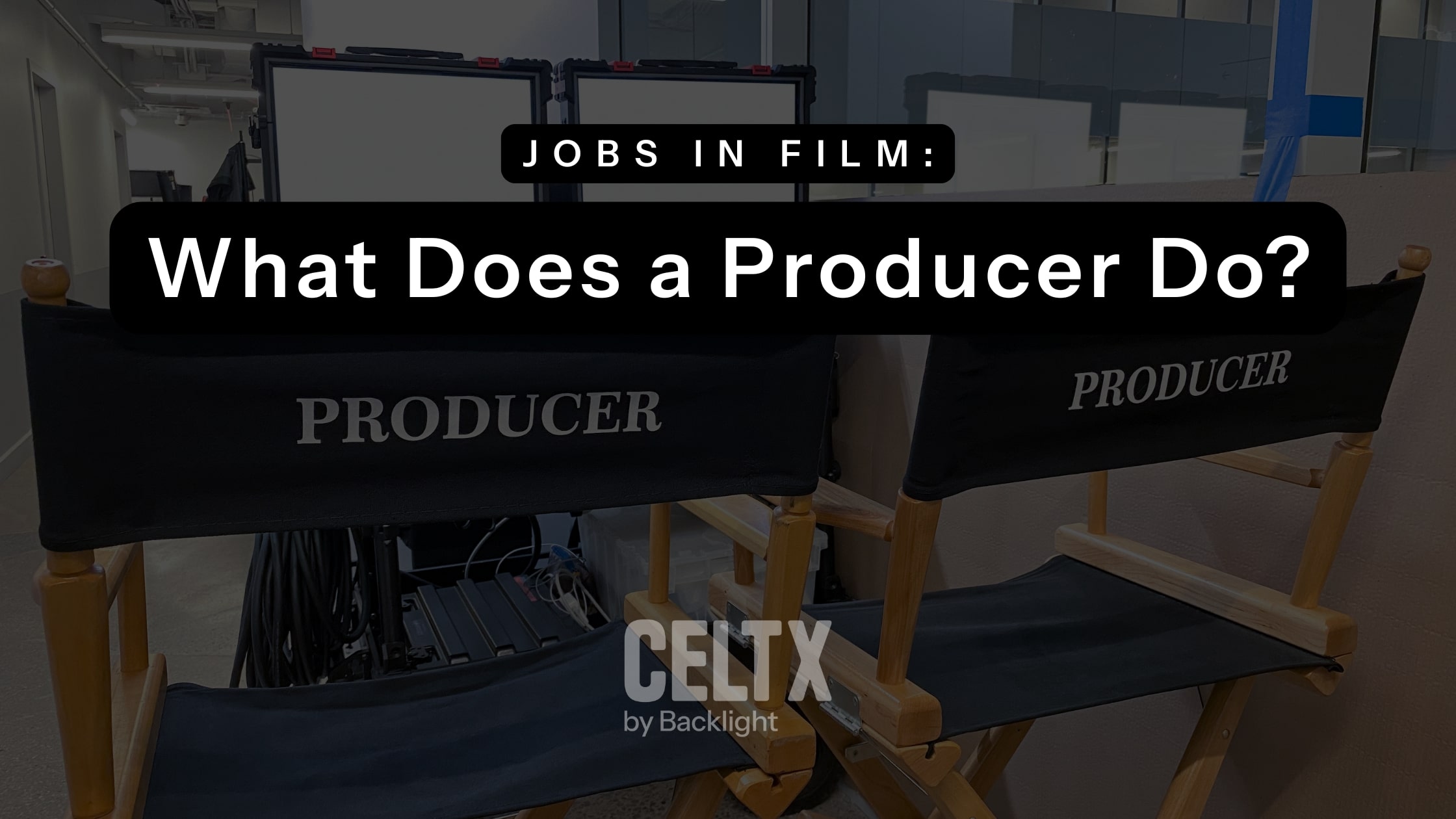
The writer writes the movie, the director directs it. So, what does a producer do, and why are they such a big deal?
In reality, producers can wear many hats, but are ultimately responsible for the logistics of a film production. From securing financing and hiring crew, to overseeing the entire film production process, the producer’s work is never complete. They are the problem-solvers, a jack-of-all-trades.
Once a film has wrapped, the producer will then move onto marketing the movie, plus coordinate its release and distribution to its audiences.
Some productions will have multiple producers who all have differing responsibilities. One producer may oversee the financial elements of the production, or merely be an investor. Another producer may work closely with the creative team, such as the director and writer, to bring the film vision to life.
Most of the time, you will find a producer on a film set, actively involved in the day-to-day running. In short, without them, there would be no production in the first place.
What is the Role of the Producer?
A film producer has different responsibilities during different stages of production. Let’s break them down!
Responsibilities During Pre Production
Planning and Team Building
During pre-production, producers assemble the creative and technical teams. This includes confirming the writer, hiring the director (if not already attached), and bringing on key roles such as cast, cinematographer, and department heads across art, costume, VFX, and makeup.
Budgeting and Scheduling
Producers oversee the budget and schedule, ensuring all elements of production are planned efficiently. They approve locations, props, designs, and the finalized script, keeping everything aligned with the project’s vision and constraints.

Coordinating Departments
Each department head manages their team, but the producer ensures all departments work cohesively. They handle approvals and solve potential conflicts before filming begins, maintaining smooth communication across the crew.
Final Pre-Production Approvals
Producers sign off on every major decision, from set design to casting and production logistics, making sure the project is ready for principal photography.
Responsibilities During Production
Once investment and the crew have been secured, and all pre-production is complete, the producer’s responsibilities shift. They remain the point of contact for all departments, but are mainly working alongside the creative team to bring the vision of the project to life. This includes the production designers and casting agents.
In terms of over-seeing budgets and schedules, these would be the responsibility of a line-producer who wouldn’t have the same level of contact with the creative team.

As we mentioned in our introduction, producers are problem-solvers, and so will be the go-to during production. Hopefully most issues will be foreseen and solved prior to the camera rolling, but something will always go wrong, however big or small the problem.
Responsibilities During Post Production
Once the camera stops rolling, the producer will liaise with the director and post-production team to edit, add visual effects, embed the score and mix the sound.
Sometimes further funding is required for these final steps in the project’s production, so the producer will go back and raise further investment. During which time, they also prepare for the film or show’s release. As the over-seer of the entire project, the producer has the final say on the finished product.
Preparation for release consists of arranging preview screenings for key players within the industry, coordinating with distributers and organizing the project’s marketing. Throughout production, they will have been in touch with their key contacts within the industry – this is a great opportunity to update them and hype them up for the movie’s release.
After all, the film industry is business. Anyone who has invested their money in the project will be expecting to make a return on their investment.
What are the Different Types of Producers?
Multiple producers, you say? Often when we watch movie credits, there are many names under the producer umbrella. Some producers are given specific titles.
Let’s take the record-breaking multiple 2023 Oscar winner Everything, Everywhere All at Once (2022)and the equally stunning Elvis (2022) as we break down the different types of producers that can collaborate on a film production.
Executive Producers
Executive producers are usually one of the top credited and have often made a notable monetary investment into a production. Alongside their own investment, they’ll be securing additional speculation and will oversee accounting and legal concerns.
The difference between an executive producer and other producers is that the exec normally supervises the others. They could be independent or work for a film studio, the financiers of the producers or the distributor, depending on the project. In smaller productions, the executive producer could also be the writer or creator who owns the source material.
In the case of Everything, Everywhere All at Once, lead actress Michelle Yeoh is also credited as executive producer alongside Team Headington, Todd Makurath, Theresa Steele Page, and Josh Rudnik.
Executive producers don’t tend to be involved in the day-to-day activities on set. To find out even more about the role of an executive producer, click here!
Creative Producers
Creative producers are the artistic partner of the director. They are heavily involved in hiring cast and crew, advising on script changes, and communication between artistic departments.
Line Producers
Line producers focus on logistics, keeping a close eye on schedules and budgets throughout the entire production. They usually liaise between other producers and ensure that the overall production is working within union regulations.
Co-Producers
Co-producers work with other producers, usually with raising money or in conjunction with another producer’s responsibilities.
Usually, co-producers will bring something crucial to the production, such as equipment, a unique service, access to a specific location, etc. We would refer to the co-producer position as being ‘above the line’, meaning they are able to make high-level decisions or are significant in the talent standing within the crew.
The credited co-producers for Everything, Everywhere, All at Once were Allison Rose Carter, Sarah Halley Finn and Jon Read. It’s also important to note that Sarah Halley Finn is also listed as the casting director, so is a perfect example of a co-producer having a vital role in an element of production. In this case, it’s casting.

Associate Producers
An associate producer will normally be hired ad-hoc to complete outstanding tasks for the production. It’s normally a negotiated credit, reserved for people who offer something small but vital to the filmmaking process, usually a writer, production executive or a rights holder.
Associate producers don’t necessarily have a specific role, but can participate in anything from pitching, revising and shot selections to handling promotions and bookings. They are what we would refer to as ‘below-the-line’ with extremely limited access to high-level decisions.
For example, Elliott Wheeler is credited as associate producer for Elvis, but also oversaw music for the film.
What Qualifications Do You Need to be a Producer?
Producers often start out in other roles within the industry, such as actors, writers, directors, or another member of the production crew. Experience and knowledge, as well as an awesome reputation, will set you off on the right foot.
If you’re just starting out and have your sights on becoming a producer, trainee or assistant positions are a great place to begin. Many producers start as runners and production assistants. The key is building your experience on a film set and to fully understand how it works.
Producers also need to know the whole of the production process from start to finish, and who, most of all, are enthusiastic about it. As the figurehead of the whole project, the producer is assertive, optimistic, and creative. They inspire the entire production: cast and crew.
With all the responsibility comes an equal measure of stress. With tight deadlines, long working hours, and a never-ending to-do list, being a producer requires a large amount of organization and self-motivation. They must be confident in compiling budgets, discussing and negotiating finance, as well as have a clear creative vision.

As you collaborate, make sure to network and build up a list of contacts on whom you can call and work with in the future. You can do this in person and also online through LinkedIn, social media, or through filmmaking groups.
Of course, you could embark on a filmmaking degree, however, this is not for everyone. Check out our post on film schools and whether they’re right for you, here.
Aside from this, build a portfolio from your own projects or those you’ve worked on. You can then easily and effectively showcase your best work to financiers or studios.
What Challenges Do Producers Face?
Self-motivation for a producer is a must-have, as well as the motivation of a cast and crew who may not always see eye-to-eye. This is where the producer has to step in and resolve any lapses in communication.
A clear and diplomatic communication style is vital for a producer, despite any challenges they may face. They aren’t afraid to say no when they have to.
Funding is also becoming more of a problem in modern-day Hollywood. With less money available within the public sector halting public-funded projects plus the reduction in development funding, it’s becoming harder for producers to get their projects off the ground.
Social media has become a fantastic strategy in combating the funding problem. A strong social media strategy is not to be sneered at in raising attention and money for a film. For example, Paranormal Activity (2007) cost only $15m to make due to producer Orin Pelli’s online strategy in the lead up to its release.
FAQs
A film producer oversees the entire filmmaking process, from developing the idea to guiding the project through production and post-production. The goal is ensuring the production is completed on time, on budget, and aligned with the creative vision.
Producers may originate an idea themselves, hire a writer, or option an existing script. They secure financing, build the initial creative team, and create pitch materials to attract investors or studios.
In pre-production, producers plan the shoot, approve the budget and schedule, hire key cast and department heads. They also oversee creative approvals like scripts, locations, sets, and props to prepare for filming.
Producers coordinate with directors and department heads to ensure filming stays on schedule and within budget. They solve logistical or creative challenges, manage resources, and keep the production moving smoothly.
Producers typically earn a development fee for early involvement. They also earn a production fee once the project is greenlit, and a share of profits depending on the film’s success and their contractual arrangement.
Yes. Producers supervise editing, sound, VFX, marketing materials, and delivery of the final product. This ensures the finished film meets creative and financial goals.
Conclusion
At the top of the film production pyramid sits the producer. They oversee, plan, and manage every aspect of the filmmaking journey, from inception to release. This wealth of responsibility means they must be personable, organized, and motivational both in themselves and for the cast and crew around them.
Most producers start their journey as a production assistant or runner, learning the ropes of a film set and what is involved in the process of making a film. It’s a job that relies on several years’ worth of knowledge and experience.
Such knowledge and experience are still in demand with the rise of streaming services and the thousands of hours of content available. The hunger for new films, shows, games, and web content is ever-growing, so it’s an exciting time for those already working in the industry, and those eager to and who are working towards breaking in.
If you are looking to become a producer, start to build a portfolio of smaller projects now, network as much as you can, and gain experience on a film set. Whether you’re a writer and produce something of your own, or you work with a peer on their project, there’s always a place to start.
Good luck!
Focus on your story, not your formatting.
Let Celtx’s Script Editor automatically apply all industry rules while you focus on the story.
Up Next:

How to Become a Producer in Film and TV
Interested in stepping into the producer’s shoes? This guide breaks down the skills, experience, and career paths you’ll need to move from aspiring filmmaker to a fully-fledged producer, so you can bring your own projects to life.

